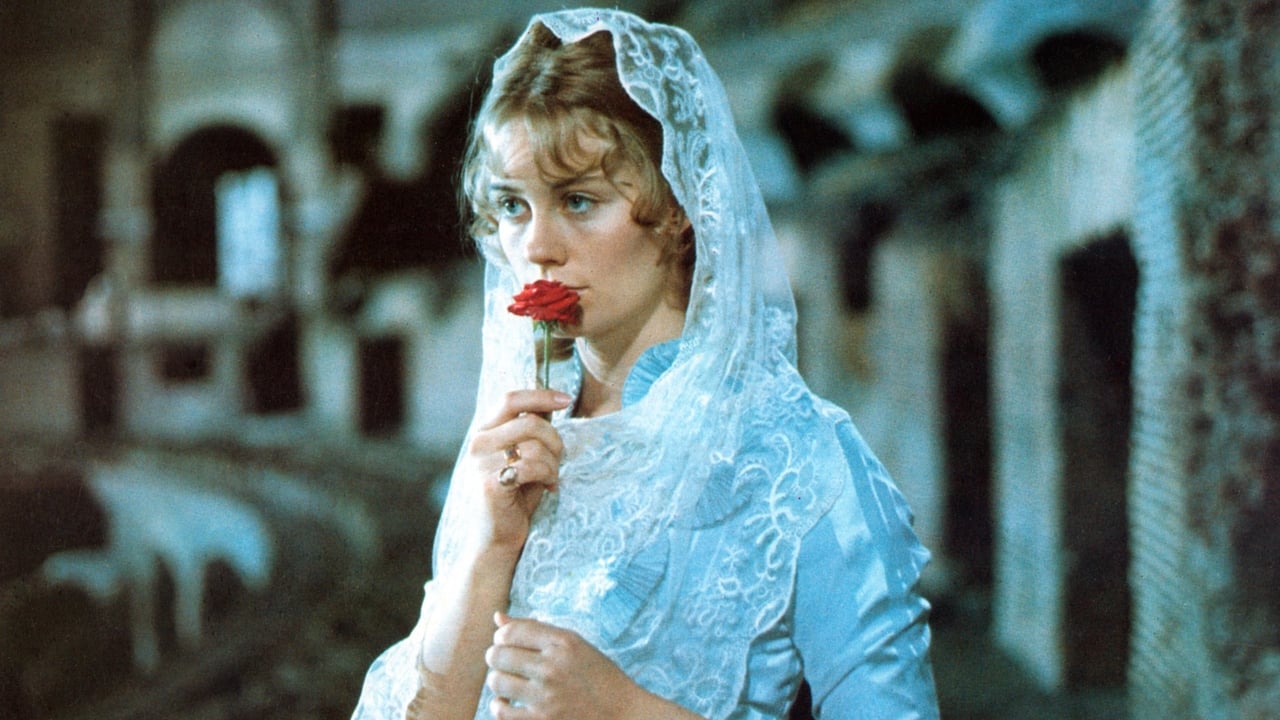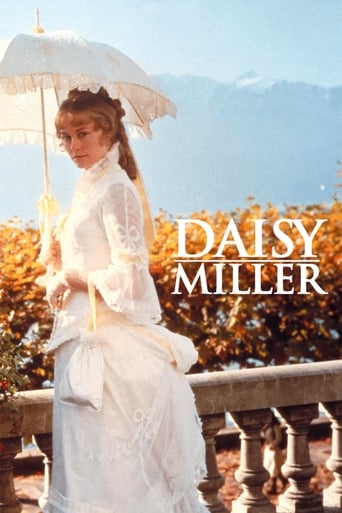



Good story, Not enough for a whole film
After playing with our expectations, this turns out to be a very different sort of film.
View MoreStory: It's very simple but honestly that is fine.
Blistering performances.
Excellent adaptation of the Henry James story about a willful girl in Europe and the price she pays.Peter Bogdanovich does an excellent job in recreating the long-ago world when Americans of means made "the grand tour" and saw everything there was to see in Europe. The leisurely world of the moneyed classes before World War I is beautifully realized here with breathtaking scenery, sets, and costumes. Just perfect.This film has been unjustly maligned for more than 30 years and needs to be re-assessed. The cast is just about perfect.Cybill Shepherd is the perfect Daisy. A naive girl from Schenectady who talks nonstop and flirts with all the men. The old women among the expatriate set think she's wicked, not very innocent, etc. But the callow American-born Winterbourne (Barry Brown) who has been educated in Geneva falls for her simple ways and beauty. Is she a mantrap? Or is she just what she seems to be.... a slightly silly girl who is a little too headstrong? Shepherd chatters and flirts to perfection, leaving Brown a flustered and confused suitor. Cloris Leachman is the ditzy mother. Mildred Natwick is the world-weary aunt. Eileen Brennan is the catty widow. Duilio del Prete is the "little Roman." Several scenes are standouts: Shepherd singing "Maggie" is a highlight. She sings nicely and is beautifully framed in a large window. The "spa" scene with Natwick and Brown is hilarious as the various "bathers" loll about in the hot-spring pool with various items floating about on inflated pillows. The aunt and nephew are taking tea while two old men play chess.... A vase with flowers drifts by... Oh so languid and leisurely an age. Og course being a Henry James story, poor Daisy does get her comeuppance.The film is a total treat, filled with good acting and humor and those gorgeous views of Vevey, Switzerland.
View MoreTranslating the Henry James novella "Daisy Miller" into a movie was difficult,owing to an insubstantial story line. However, Peter Bogdanovich had it fleshed out considerably to showcase Cybill Shepherd (who was woefully miscast in the role.)Instead, Bogdanovich unwittingly memorialized another, much more talented performer for posterity.The movie begins in the hallway of a Swiss resort hotel, circa 1880. A rank of freshly-blackened boots and shoes stand just outside each door. A small boy, Randolph Miller (James McMurtry) retrieves his boots, leaves his apartment, and after stealing a walking stick downstairs, saunters outside, demanding a lump of sugar from the languid, yet congenial Frederick Winterbourne (Barry Brown) who is trying to read a newspaper.Frederick then falls into conversation with a young, garrulous woman, Daisy Miller, the young boy's sister (Cybill Shepherd), and agrees to accompany her to visit a castle, the Chillion.In a surrealistic scene, where Frederick and his aunt, Mrs. Costello (Mildred Natwick) are drinking tea (fully dressed, in a public bath in water up to their chests), Mrs. Costello warns her nephew away from involvement with the vulgar, nouveau riche Miller menage (daughter, son, and mother.)That evening, Winterbourne meets Daisy and her mother during a walk, and Daisy tries to wheedle an evening boat ride with Winterbourne, but is dissuaded by the family courier, Eugenio.The next day, Winterbourne takes Daisy to the castle and attempts to tell her its history, but Daisy is unimpressed and instead, chides Frederick about his older mistress in Geneva. She does, however, extract a promise from him to visit them in Italy next year.While in Rome with his aunt, Frederick Winterbourne attends a party hosted by a Mrs. Walker, a sardonic woman who enlightens Winterbourne about the gossip swirling around Daisy. Daisy has taken up with a local adventurer, Giovanelli, thus adding fuel to the scandal.Mrs. Walker tries to get Frederick to stop Daisy from parading around publicly with Giovanelli, but Daisy refuses, and Frederick (witnessing the two kissing behind Daisy's parasol) - storms off, enraged.When Daisy brings Giovanelli to a party of Mrs. Walker's and persuades him to sing, Mrs. Walker thinks Daisy is presumptuous and cuts her cold.In a rented hotel room (where Giovanelli and Daisy are practicing songs on a grand piano), Daisy torments Frederick by telling him that she and Giovanelli are engaged.Afterward, riding at nighttime in a friend's carriage, a morose Frederick disembarks at the ruins of the Colosseum. Hearing laughter, he follows the sound and finds Giovanelli and Daisy, chatting. Winterbourne upbraids Giovanelli for exposing Daisy to the malarial night air, then leaves, feeling betrayed.However, during an opera performance Winterbourne is told that Daisy has contracted malaria and rushes to her side, where he learns from her mother that Daisy was not engaged to Giovanelli (who has deserted Daisy), but was trying to make Frederick (for whom she actually cared) jealous.As Frederick is bringing Daisy a bouquet of flowers he learns the tragic news: Daisy has died.At Daisy's grave site are Daisy's mother, her brother, Mrs. Walker, Eugenio, Frederick, and belatedly, Giovanelli (who tells the heart-stricken Frederick that "Daisy was an innocent girl", thus confuting all the lies surrounding her.)The others leave the grave site except Frederick, who stands there, wraith-like, as the mists envelop him...As Daisy Miller, Cybill Shepherd was the wrong choice: too old, and no natural spark, or empathy connecting the characters of Winterbourne and Daisy. Ms. shepherd chattered her lines as though running the four-minute mile, and her delivery was by rote, without the vibrancy necessary for a convincing performance.Modeling is Ms. Shepherd's métier; acting isn't.Performances by such professional actresses as Mildred Natwick and Eileen Brennan were excellent. Ms. Natwick was convincing as Frederick Winterbourne's stuffy, socially correct aunt, and Eileen Brennan was delightfully feline as she unsheathed her claws over the faux pas of the outrageous Daisy Miller.Duilio Del Prete (Giovanelli) provided comic relief as the ingratiating adventurer, and James McMurtry (Randolph) makes childlessness look inviting.The real kudos, however, belong to the actor who actually carried the movie, and who, in the past, has been unjustifiably blamed for its failure. I am referring to the late, incomparable Barry Brown.Barry brown was a phenomenal screen presence, and if he had lived when Hollywood was still king, he would have become a screen legend. (An early, tragic death cut a promising career short.)Barry Brown was extremely handsome, charismatic, and intellectual. his large, lambent dark-brown eyes in his highly expressive face were capable of conveying a multiplicity of emotions throughout the movie, ranging from pleasantness through anguish, all the way to dark, smoldering hatred.In fact, prior to the filming of "Daisy Miller", Brown sent the producer, Peter Bogdanovich a five-page précis of his own impressions and psychological insights into the James novella.To explicate his upcoming interpretation of the Winterbourne role, Brown contrasted French vs. German formalism, citing Immanuel Kant's "The Critique of Pure Reason" to substantiate his argument. In other words, Barry Brown was an actor who could both act - and think.However, there was apparently a "falling out" on the set, and the failure of the film consigned Barry Brown to the purgatory of "box office poison."As acting jobs became fewer, Brown fell deeper into alcoholism and depression, and ultimately, this sensitive troubled young man committed suicide in 1978, at the age of 27.This motion picture may have been called "Daisy Miller", but Barry Brown's acting ability was its most valuable asset. If you watch "Daisy MIller" for one reason only, watch it for Barry Brown's compelling performance as Frederick Forsyth Winterbourne.
View MoreI strongly disagree with the limited, parochial, and dismissive comments of other reviewers' comments. Daisy Miller is a superb and literal adaptation of the Henry James novella. It is still a joy to watch and enjoy this period piece which is perfectly cast. I completely agree with Orson Welles that Cybill Shepherd was born to play Daisy Miller. Her performance is effortless and she aptly embodies Daisy in both looks and spirit. Bogdanovich was right on the mark with the casting of Ms. Shepherd. While it is true she was his girl friend at the time, it is also true that she was perfect for the role. Her interpretation involves rushing through the dialogue as if she couldn't wait for a response so she in turn could reply and in this case it is exactly what Daisy would have done. Cybill Shepherd was at the apex of her beauty and talent in Daisy Miller. She had just starred in three great American films-Last Picture Show, Heartbreak Kid, and Taxi Driver. Daisy Miller could easily be considered along with the three aforementioned film. When I am bored with high tech films, loud action adventure films, and post modern films, I often return with great pleasure to the sumptuous and beautifully realized Daisy Miller.
View MoreThere are moments of silence in the movie that focus on a very young Cybill Shepherd. It is easy to understand why Peter Bogdanovich was so taken with this very beautiful young lady and why he allowed the camera to just linger on her lovely face. It was also the best feature of the film.When she spoke her lines however it seemed like a race to finish each sentence and begin the next one before anyone could interrupt her. Or perhaps just to get through it before she forgot the lines. There was some improvement in the speech tempo as the film progressed and this style of speaking was not limited to her but applied to several others. I rate movies based on whether I would watch it again. **** Could watch it again, and again, etc. *** Could watch it once or twice a year. ** May watch it again if it showed up while flipping channels. * Would NOT watch it again.Rating for this film is no *'s at all.That does not make it a bad movie, and I did enjoy moments in the film, just not enough of them to see it again.
View More